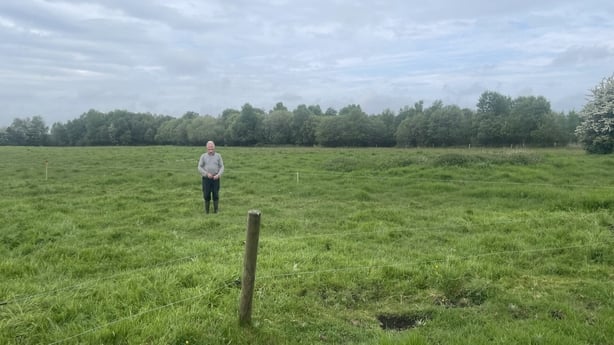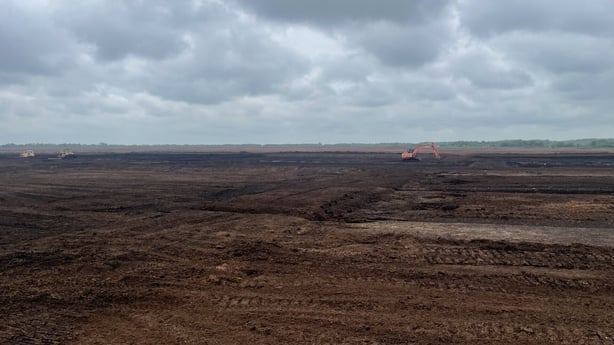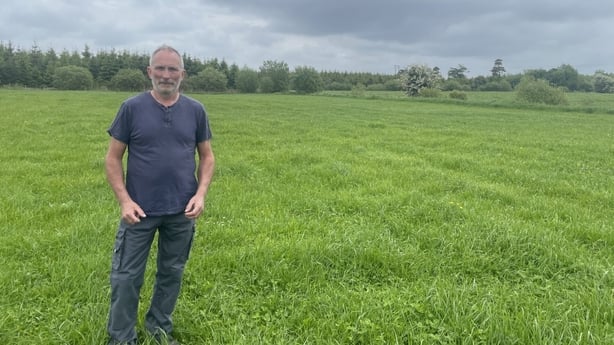There is growing concern among farmers over new EU laws designed to protect nature and biodiversity.
The Nature Restoration Law, which will set legally binding targets to return 20% of land and sea area to nature by 2030, will require the re-wetting of peatlands, raising questions for the future of reclaimed bogland for farmers in the midlands and beyond.
Bord Na Móna has already begun re-wetting State owned lands, which is having an impact on adjacent farmland.
Michael Guinan's land lies 1km from the re-wet Pollagh Bog near Rahan in Co Offaly.
Bord na Móna began re-wetting the bog, a process to restore natural water flow and saturate peatland, in late 2021.
Mr Guinan said one of his fields has appeared wetter than at any stage since 1980.
Speaking on RTÉ's This Week, he said an area of cutaway bog has been farmed by his family for around 100 years and since it was drained previously by Bord na Mona it has been better agricultural land because it is drier.

Mr Guinan said that normally he would spread fertiliser in the area in late February or early to mid-March, but this year was not able to do until last week.
"If you look across the land, you can see the difference in it. You can see how dark it is, that it got no fertiliser, that's my concern.
"I'm not saying it's Bord na Mona, but I think it's unusual that it's this year that the land was unworkable for so long. Now, thankfully, it has dried up in the last couple of weeks there, but I never saw it so wet, so early in the year at the last at the end of last year, and wet so late in the year, this year."
Dairy farmer Pat O'Brien owns land in Kilmurry, near the Derries Bog, around 15 minutes away from Mr Guinan's land.

"Water is a very hard thing to control and if it decides to go somewhere it usually gets there," he said.
Mr O'Brien said the bogs "have taken 80 years to dry out and it could take 15 to 20 years before the effects of this start to show in the adjoining lands."
He said that the adjoining lands may not have to be 200 metres away, "they could be a couple of kilometres away because the water will travel underground, or underground streams and springs that have dried up over the decades, that will slowly rewet. And the longer the bog is rewetting, and the more it will rise, it'll be like a water tower. It'll force the water further away from it."

Mr O'Brien said there have been issues with rivers, bursting their banks and flooding a couple of acres because of poor maintenance of the rivers, "which is a totally different thing, but we're already affected by that and with this Nature Restoration Act coming down the road, then as well they're talking about raising the groundwater in, peatland areas and that's going to exacerbate the whole problem again."
ICMSA president Pat McCormack believes that what is happening on Mr Guinan's farm shows the potential consequences of the Nature Restoration Act and called for clarity from Minister for Agriculture Charlie McConalogue, who has said it is a voluntary act.
"How can it be voluntary? If my neighbour decides to go in and re-wet land and it has an impact on me, that's not voluntary for me."
Mr McCormack said the minister is "really only creating confusion. I'm looking at farming for the last 10-15 years and various different schemes that were brought in and were voluntary. They may be voluntary today, but it could be very compulsory tomorrow."
Not only does the EU Nature Restoration Act include provisions for mandatory re-wetting of 45,000 hectares of Ireland's drained farmed peatlands by 2030, it is hoped it will restore threatened habitats, species and restore ecosystems.
Agriculture and Land Use Officer with the Environmental Pillar Fintan Kelly said if emissions on bogs are not reduced, then that leaves it to society to reduce emissions in other areas.
He said that could mean reductions in livestock or even bigger targets for afforestation, "which is obviously going to have to replace farming in parts of the country" and it means "taking cars off the roads, etc."
Mr Kelly said he has "absolute massive sympathy with farmers who are experiencing flooding of their lands as the result of rewetting" and described himself as "massively frustrated from the environmental side as well."
He said farmland was always going to be impacted to some extent, but, he said, the question is, why have successive governments not put a coherent plan in place to engage with farmers and communities and make sure the funding is in place to help them manage these lands better.
"So if farmland is going to be re-wetted, can we at least have a scheme in place? Can we work with farmers? Can we see what will work for them? What will work for the climate and for biodiversity?"
In a statement, Bord na Móna said stakeholders, including the ICMSA, the IFA, and ICSA are all notified by email of all rehabilitation plans and invited to make submissions on each draft plan.
It said a Community Liaison Officer to deal specifically with this project has been appointed and that Virtual and in-person meetings have taken place with many groups and organisations, and a number of site visits to rehabilitated bogs have taken place with these groups.
The statement continued that Bord na Móna "is on track to complete the rehabilitation of 13,750 hectares across 39 separate bogs throughout the first two years of the Peatlands Climate Action Scheme (PCAS)."







